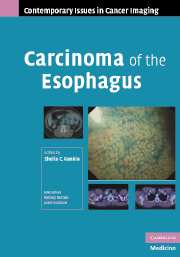Book contents
- Frontmatter
- Contents
- Contributors
- Series foreword
- Preface to Carcinoma of the Esophagus
- 1 Epidemiology and Clinical Presentation in Esophageal Cancer
- 2 Pathology of Esophageal Cancer
- 3 Recent Advances in the Endoscopic Diagnosis of Esophageal Cancer
- 4 Endoscopic Ultrasound in Esophageal Cancer
- 5 CT in Esophageal Cancer
- 6 FDG-PET and PET/CT in Esophageal Cancer
- 7 The Role of Surgery in the Management of Esophageal Cancer and Palliation of Inoperable Disease
- 8 Chemotherapy and Radiotherapy in Esophageal Cancer
- 9 Role of Stents in the Management of Esophageal Cancer
- 10 Lasers in Esophageal Cancer
- Index
- References
7 - The Role of Surgery in the Management of Esophageal Cancer and Palliation of Inoperable Disease
Published online by Cambridge University Press: 08 August 2009
- Frontmatter
- Contents
- Contributors
- Series foreword
- Preface to Carcinoma of the Esophagus
- 1 Epidemiology and Clinical Presentation in Esophageal Cancer
- 2 Pathology of Esophageal Cancer
- 3 Recent Advances in the Endoscopic Diagnosis of Esophageal Cancer
- 4 Endoscopic Ultrasound in Esophageal Cancer
- 5 CT in Esophageal Cancer
- 6 FDG-PET and PET/CT in Esophageal Cancer
- 7 The Role of Surgery in the Management of Esophageal Cancer and Palliation of Inoperable Disease
- 8 Chemotherapy and Radiotherapy in Esophageal Cancer
- 9 Role of Stents in the Management of Esophageal Cancer
- 10 Lasers in Esophageal Cancer
- Index
- References
Summary
Introduction
In spite of improvements in diagnosis, staging, and treatment, the outcome for patients with esophageal cancer remains poor. Although 1-year survival has improved in recent years, there has been little change in the 5-and 10-year survival (Figure 7.1). This is because many of the patients have metastatic disease, with a large percentage having micrometastases. These have been found in the bone marrow in patients undergoing resection in 88% of cases.
A significant factor in the improved 1-year survival is the reduction in inhospital operative mortality (Table 7.1). This relates to improvement in staging, fitness testing, technique, perioperative care, and probably most importantly centralization of services in large centers (Table 7.2). In a study from the United Kingdom there was a 40% reduction in operative mortality for every 10 patient increase in a surgeon's caseload.. Such large centers with dedicated teams can achieve inhospital mortality figures of less than 2% by utilizing a multidisciplinary team approach.
Another factor in improved short-term survival is the recognition that surgery alone is not the answer for most cases and that survival benefits can accrue by the use of preoperative neoadjuvant chemotherapy and possible chemoradiotherapy. This is certainly now the practice in the United Kingdom for all cases other than early T1/2 N0 disease. Whether such treatment acts as a prolongation of disease-free interval only or improves long-term cure remains to be determined.
- Type
- Chapter
- Information
- Carcinoma of the Esophagus , pp. 107 - 121Publisher: Cambridge University PressPrint publication year: 2007

